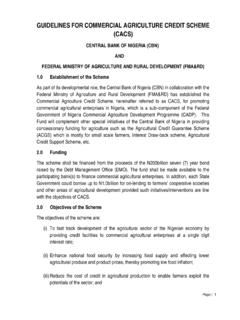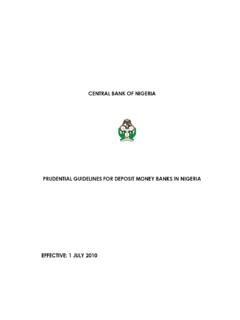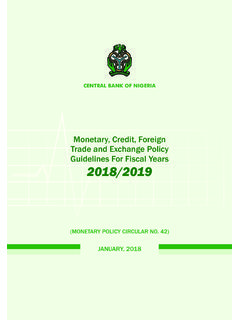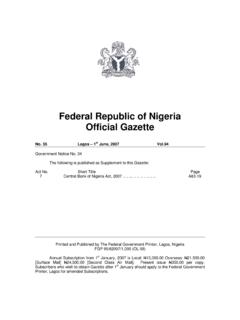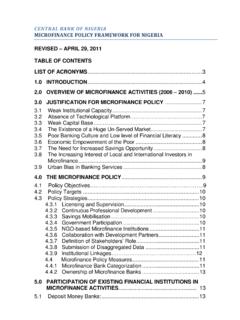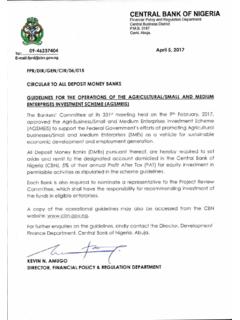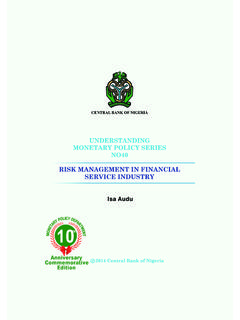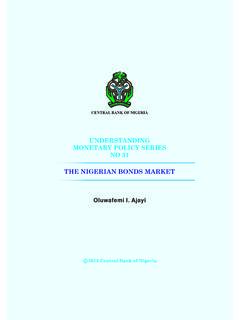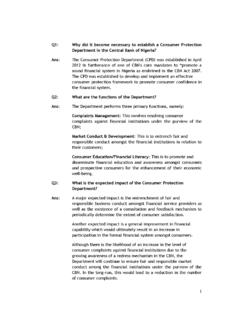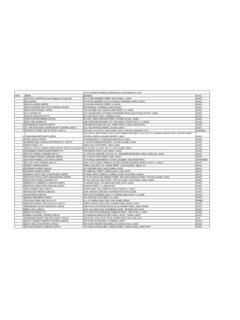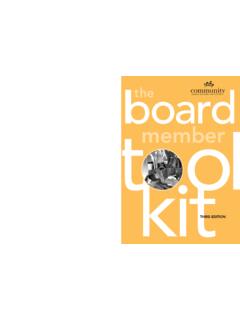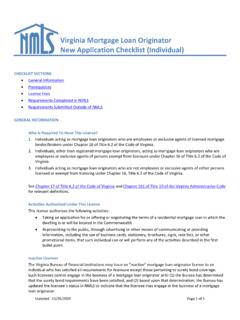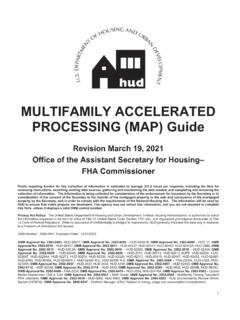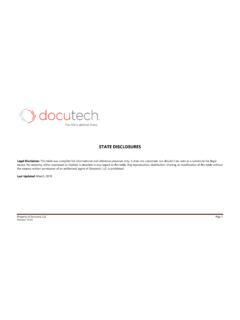Transcription of Consumer Protection Framework - Central Bank of Nigeria
1 Consumer Protection Framework 2 Consumer Protection Framework 3 Contents Preamble 5 1 Introduction 6 Objectives 6 Scope 6 Definition of Key Terms 7 2 Consumer Protection Principles 9 Legal, Regulatory and Supervisory Structures 10 Legal and Regulatory Framework 10 Supervisory Framework 10 Responsible Business Conduct 13 Communication 13 Provision of Financial Advice 13 Responsible Lending 14 debt collection 15 Sales Promotion 15 Disclosure and Transparency 15 Contract Terms 16 Notice of Variation 17 Advertisement 17 Consumer Financial Education 18 Consumer Segmentation 18 Content Development 18 Strategy 19 Consultation and Collaboration 19 Monitoring & Evaluation 20 Fair Treatment 20 Access to finance 20 Equity 20 Unfair Contract Terms 21 Protection of Consumer Assets and Privacy 21 Fraud 22 Data Protection 23 Complaints Handling and Redress 24 Complaints Channels 24 Complaints Management Processes or Procedures 25 Complaints Redress 27 Collaborations with other bodies 27
2 Consumer Protection Framework 4 Competition 28 Free Market 28 Switching Barriers 28 Enforcement 29 Enforcement Processes or Procedures 29 Enforcement Methods 29 3 Consumer Rights and Responsibilities 31 Consumer Rights 31 Consumer Responsibilities 32 Consumer Protection Framework 5 Preamble The Consumer Protection Framework (herein referred to as the Framework ) is issued by the Central Bank of Nigeria (herein referred to as the CBN or the Bank), in exercise of the powers conferred on it by the Central Bank of Nigeria Act of 2007, as amended (hereinafter referred to as the CBN Act) and the Banks and Other Financial Institutions Act of 2007, as amended [the BOFIA]. The Framework shall guide the effective regulation of Consumer Protection practices of Financial Institutions (FIs) under the regulatory purview of the CBN to ensure that consumers of financial services are adequately protected and treated fairly.
3 It documents the roles and responsibilities of the regulator, the FIs and the consumers in ensuring that the standards set, are met. Consumer Protection will be guided by nine (9) key principles. It should be read in conjunction with the provisions of the CBN Act, the BOFIA and subsidiary regulations made under these Acts. Consumer Protection Framework 6 1 Introduction The mandate of the CBN to promote a stable financial system underscores the need for the Bank to develop and implement a Consumer Protection Framework that ensures the Protection of Consumer rights. Furthermore, the 2008 global financial crisis re-emphasized the need for concerted efforts among regulators in various jurisdictions to establish robust policies and structures aimed at regulating the conduct of operators, with a view to protecting Consumer 's assets.
4 To enhance focus on the Consumer agenda and ensure that consumers of financial services are protected and treated fairly, the CBN recognized the need to develop an effective and overarching regulatory Consumer Protection Framework . The Framework which is a product of extensive engagements and consultations with critical stakeholders, sets out the minimum standards for financial Consumer Protection and is developed in conformity with international good practices and standards. Objectives The broad objective of the Framework is to enhance Consumer confidence in the financial services industry and promote financial stability, growth and innovation. Other specific objectives of the Framework are to: a) protect consumers assets; b) ensure timely complaints handling and dispute resolution; c) ensure financial services operators put in place effective Consumer risk management Framework ; d) empower consumers to make informed decisions; e) promote professionalism and ethics; and f) outline the rights and responsibilities of consumers.
5 Scope The Framework shall guide the effective regulation of Consumer Protection practices of Financial Institutions (FIs) under the regulatory purview of the CBN to ensure that consumers of financial services are adequately protected and treated fairly. These Institutions include Commercial or Merchant Banks, Specialized Banks, Micro-finance Banks (MFBs), Discount Houses (DH), Development Finance Consumer Protection Framework 7 Institutions (DFIs), Finance Houses (FHs), Bureaux-de-Change (BDCs), Primary Mortgage Banks (PMBs), Credit Bureaux, Mobile Money Operators and other institutions licensed by the CBN. Definition of Key Terms Alternative Dispute Resolution (ADR): refers to any means of settling disputes outside of the courtroom after complaints have initially been lodged with a financial institution.
6 Consultant: refers to an entity that files a complaint on behalf of a Consumer and therefore acts as an agent of the Consumer . Consumer : refers to a person or an entity that uses, has used or a potential user of financial products or services of a FI. Consumer Financial Education: is the process of imparting financial knowledge and skills to consumers to enable them manage their personal finances effectively and make informed decisions. Consumer Protection Department (CPD): the department of the Central Bank of Nigeria charged with the responsibility of protecting Consumer . Customer: refers to a person that has a relationship, by reason of benefitting from financial products or services offered by a FI. Complaint: dissatisfaction expressed by a Consumer on financial product or service provided by a FI which may or may not have caused financial loss. Financial Consumer Protection : refers to laws, institutions, practices and policies to safeguard Consumer rights and ensure fairness in the provision of products and services by financial institutions.
7 Financial Inclusion: The process of ensuring easy access by an individual to a broad range of formal financial services that meet their needs at an affordable cost. Financial Literacy: is the possession of knowledge, skills and confidence required to manage personal finances and make informed financial decisions. Financial Institution: refers specifically to financial institutions (together with their staff, agents or representatives) regulated by the Central Bank of Nigeria . Financial institutions include Commercial or Merchant Banks, Specialized Banks, Micro-finance Banks (MFBs), Discount Houses (DHs), Development Finance Institutions (DFIs), Finance Houses (FHs), Bureaux-de-Change (BDCs), Primary Consumer Protection Framework 8 Mortgage Banks (PMBs), Credit Bureaux, Mobile Payment Companies, Mobile Money Operators or any other institution as may be licensed by the CBN from time to time in line with the relevant provisions of BOFIA.
8 Financial Ombudsman: an organization, institution or office with the mandate to investigate and address complaints against financial institutions. Vulnerable Group: includes the elderly, less educated, physically challenged, foreigners, critically ill, refugees, immigrants, mentally challenged individuals, low income earners or any other category of persons that may be at risk of financial exclusion. Consumer Protection Framework 9 2 Consumer Protection Principles The Framework is guided by the following: a) G20 High Level Principles These principles were developed by the Organization for Economic Cooperation and Development (OECD), the Financial Stability Board (FSB) and other relevant international organizations in response to the request by the G20 Finance Ministers and Central Bank Governors to develop common principles to guide Consumer Protection in the field of financial services.
9 The principles were endorsed by the G20 in October 2011. b) World Bank Good Practices These practices were developed in 2012 by the World Bank to complement the High Level Principles created by the OECD. c) Four Pillars of Consumer Protection These principles were developed by the Financial Services Consumer Panel (FSCP) to guide the European Parliament in evaluating every element of the financial services legislations aimed at enhancing Consumer Protection . Consequent upon the review of the above and in recognition of the peculiarities of the Nigerian financial services industry, the following principles are contained in the Framework : 1. Legal, Regulatory & Supervisory Structures; 2. Responsible Business Conduct; 3. Disclosure & Transparency; 4. Consumer Financial Education; 5. Fair Treatment; 6. Protection of Consumer Assets, Data 7. Complaints Handling 8.
10 Competition; and 9. Enforcement. Consumer Protection Framework 10 Legal, Regulatory and Supervisory Structures There shall be effective legal, regulatory and supervisory structures to protect consumers of banking and other financial services regulated by the Bank. These structures shall evolve based on emerging market trends. Institutions responsible for Consumer Protection shall have the necessary authority to fulfil their mandate; clear responsibilities supported by appropriate governance structures; operational independence and high professional standards. The primary coverage areas to be addressed under this principle are: Legal and Regulatory Framework periodically, laws and regulations may be required for the effective regulation of financial institutions.
